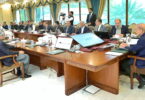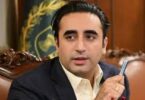Muhammad Asad
ISLAMABAD: The Prime Minister Imran Khan has set red line for Economic team that there must be no more financial burden on the poor and salary persons during next fiscal year budgetary estimate.
It was observed by Finance Minister Shoukat Tarin while unveiling Economic Survey of the Country for FY 2021 and next year budget allocations and priorities in a news conference along with including SAPM on Poverty Alleviation and Social Safety Ms. Sania Nishtar, Federal Minister for
ndustries and Production Makhdoom Khusro Bukhtiar, SAPM on Commerce and Investment, Mr. Abdul Razak Dawod and others in Islamabad on Thursday.
While shedding light on economic survey of the country for the year 2021, Finance Minister Mr. Shoukat Tarin said that despite of the Coronavirus pandemic the growth rate has raised upward due to boost in manufacturing and services sectors during last quarter of the out going fiscal year and marked the unprecedented rate of 3.9 percent. According to him the previous estimates were not more than two percent but increase in large scale manufacturing raised up to 9% and gave a boom to overall economy.
He expressed the government’s resolve to maintain this growth rate to achieve a sustainable economy in the country. According to Tarin, government aims at achieving 6-7 percent growth rate in the years to come.
While discussing on financial position and performance of the government during previous year, Tarin said that the total debt has increased by 1.7 trillion from 2020-2021 and termed it a huge decline as compare to previous years. He claimed that total debts and liabilities stood (TDL) at Rs. 45 trillion rupees by the end of March 2021. According to him during 2020, the total debts and liabilities (TDL) by the end of Jun 2020 were at Rs. 44.6 trillion rupees much higher than current year. He said that toral debt of the government has raised by 1.5 percent during previous year.
He informed that the total debts and liabilities stood at 95.3 percent of total GDP of the country by the end of 3rd quarter of previous fiscal year, which was 103 percent of total GDP in the same period during last year. While summing up the most difficult equation for the poor masses he informed the media men that total debts and liabilities had decreased by 8 percent in one year.
According to him, the government attained this growth rate due to incentivized policies in Manufacturing sector, provision of subsidies in electricity and assistance to the agriculture sector.
While stressing on the need of a sustainable economy he said that for sustainable economy we must earn dollars and for that end you must increase your exports he said export, export and export the only way to strengthen the country’s economy.
He said that FBR had collected a record revenue of Rs. 4.2 trillion rupees during last year. He vowed to end the FBR’s harassment during next year by introducing self-assessment and third-party audit.
He also warned that after implementation of new rules there will be imprisonment for the cheaters and wrong doer. He said that foreign remittances had reached a record level of US $ 26 billion during previous year and it’s the expression of overseas Pakistanis confidence in Imran Khan’s government and its policies.
While talking about IT industry Tarin said that it is the future of our country and for that end government must focus on it. Currently it is growing about 40-50 percent which needs to reach at 100 percent. While referring to India he said that Indian IT export were at $ 1 billion during 2000 while in 2010 Indian IT exports reached at 100 billion dollars. He emphasized while saying IT, IT, and IT and why we cannot reach to half of the India’s achievement?
While touching agriculture, Tarin said that the despite of huge loss in cotton sector our agriculture sector marked 2.77 growth rate during previous year. He noted that Pakistan was the net exporter of the food items during the past but currently we are net importer of food and due to reason international market prices effects the commodities prices in the country.
While commenting on energy sector, he termed it a black hole for the government and said that previous government generated extra energy and now facing capacity payments as unbearable burden in coming days. According to him, during year 2023 the capacity payment would be three times more than current year. He noted that if the economy continue to grow 5-6 percent annually even then the it will take years to utilize the overbuilt energy and resolution of the capacity payment issue.
He said that DISCOs are continuously running in loss and government provides significant amount to them every year. He said government wants to sell them to private sector after bringing some improvements in these enterprises.
While responding to a media query regarding privatization of state-run entities, Tarin said that it is his top priority and he has experience of privatizing HBL during 2009-2010. He said government wants to establish a board comprising technical experts and professional (excluding politicians) under privatization commission and all such entities would be brought under subject board. The board will work out on significant reforms in those entities and further lead them to privatization.
While talking about government’s effort for poverty alleviation, Tarin said that the world bank has acknowledged the importance of the Ehsaas program and commented that Ehsaas program is the world finest and
the largest poverty alleviation program in the world. He gave its credit to SPAM Poverty alleviation Ms. Sania Nishtar and his achievement in successfully disbursing Ehsaas cash to 15 million families across the country during pandemic.
While answering a query regarding huge difference in country’s direct and indirect taxation, Tarin said that most of the developed countries including China, Turkey and others initially gathered their most of the revenue through indirect taxes, later with the passage of time and documentation and formalization of the economies they turned to direct taxes and Pakistan is also working in that direction and hopefully with documentation of the economy we will go for that end.
While answering a query regarding IMF demands from Pakistan with regard to upcoming budget, Tarin said that currently Pakistan is gathering about 113 billion rupees in personal taxes while IMF demands to add 150 billion more in this head. However, government of Pakistan disagreed it and promised to meet the target from other resources.
Tarin noted that Pakistan and IMF both have same target of achieving a sustainable economy, but the ways and means are different. He said government cannot afford an increase in taxes or tariff on poor and salary persons because these measures would result in an increase in inflation.
While talking on CPEC, he said that government had completed CPEC, connectivity road network and Special Economic Zones (SEZs) in the country but no significant efforts were made for investment. Presently, PTI government is negotiating with China to bring Chinese investors and manufacturers in the Country so economic revival can be brought in the country through CPEC.
SAPM on Commerce and Investment, Razak Dawod said that government wants to bring diversify in the country’s exports. He informed that the country’s export was at $ 22.5 billion by the end of May 2021 and hopefully by the end of Jun these figures will reached up to 25 billion dollars. He said that government is focusing on increasing pharmaceutical industry, and fruit export besides endeavoring for more production in cotton and leather.
Federal Minister for Industries and Production Makhdoom Khasro Bukhtiar said that PTI government has increased wheat prices by Rs. 500 per 40 kg whereas PML-N increased Rs. 100 per 40 kg during their era. He also informed that government had formed an agricultural working group under CPEC and collaborating with China to increase its agricultural growth.
SAPM on Poverty Alleviation and Social Safety, Ms. Sania Nishtar said that due to coronavirus pandemic about 24 million people lost their jobs and government successfully disbursed cash payments to 15 million families under Ehsaas program. She noted that her team is also working on several other social welfare and poverty alleviation initiatives besides giving away cash payments to the deserving people.






